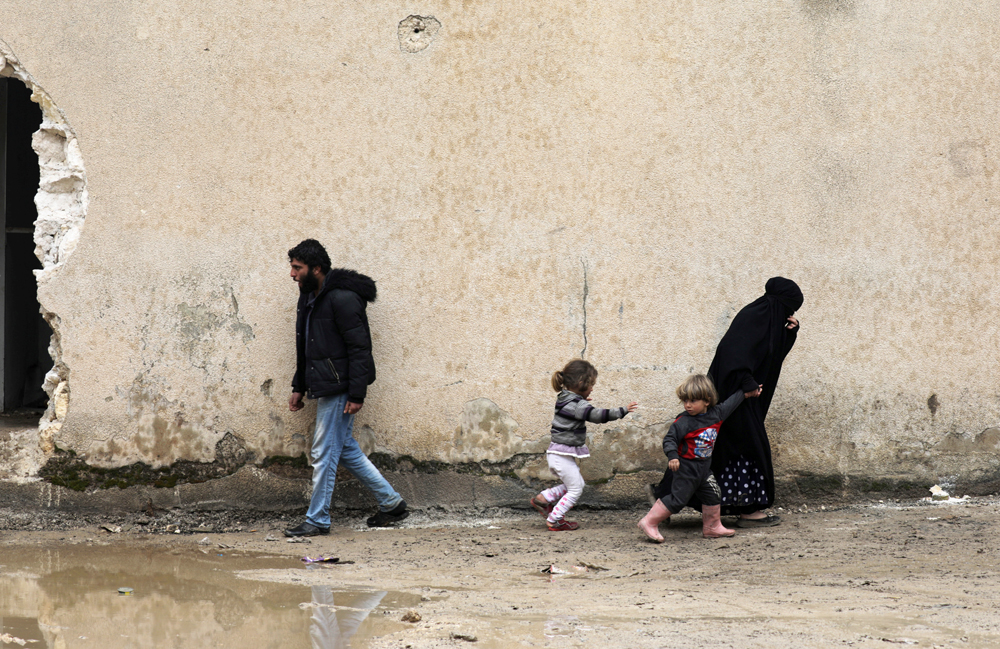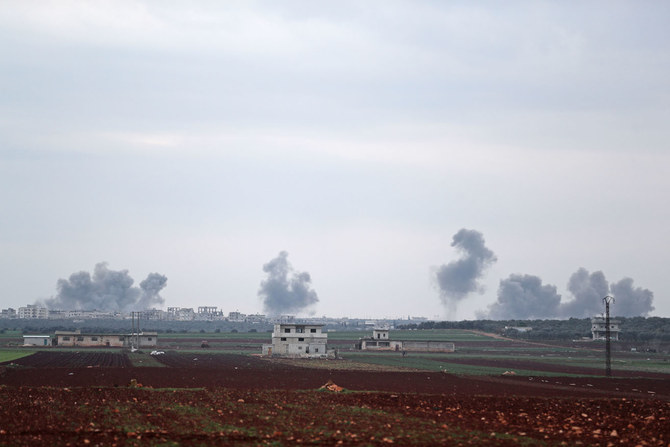ANKARA/PARIS: The UN warned on Friday that fighting in northwest Syria could “end in a bloodbath” and called again for a cease-fire, while Moscow denied reports of a mass flight of civilians from a Russian-led Syrian regime offensive.
Syrian regime troops backed by Russian air power have been battling since December to eliminate the last opposition strongholds in the region in a war that has killed an estimated 400,000 Syrians, displaced millions more and left much of the country in ruins.
The latest offensive in the regions of Aleppo and Idlib has uprooted nearly 1 million people who have fled clashes to seek sanctuary further north, near the Turkish border.
The unfolding crisis is pushing Turkey to improve its relations with the West.

Syrians displaced by war walk at an empty school and university compound used as shelter, in Azaz, Syria, on Feb. 21, 2020. (REUTERS/Khalil Ashawi)
The following day, in a phone call with his French and German counterparts, Turkish President Recep Tayyip Erdogan called for “concrete action” to prevent a humanitarian crisis in Idlib.
Erdogan “stressed the need to stop the aggression of the regime and its supporters in Idlib, and emphasized the importance of providing strong support through concrete actions to prevent a humanitarian crisis.”
French President Emmanuel Macron and German Chancellor Angela Merkel spoke on Thursday to Russian President Vladimir Putin to express their concern about the humanitarian crisis and to urge an end to the escalating fighting in Idlib.
Opinion
This section contains relevant reference points, placed in (Opinion field)
Ozgur Unluhisarcikli, Ankara office director of the German Marshall Fund of the United States, told Arab News: “Despite many differences between Turkey and EU member states on foreign policy issues ranging from northeast Syria to Libya, they’re stakeholders in preventing a humanitarian disaster in Idlib and a new wave of refugees from Syria to Turkey and Europe.”
He said it would be out of the question for Western countries to send troops to Idlib, but they could provide Turkey with political support and Patriot surface-to-air missile systems close to the border with Syria.
“A declaration of commitment to improving the livelihoods of residents in Idlib after the regime offensive is averted should also be in the mix,” he added.
“A follow-up of the quadripartite meeting between the leaders of France, Germany, Turkey and the UK, this time in Turkey, would be a very good platform for announcing solidarity with Turkey.”
Bassam Barabandi, a former Syrian diplomat and cofounder of People Demand Change Inc., told Arab News: “Nobody considers the humanitarian crisis a top priority right now. The humanitarian tool has become the price of the ongoing struggle among the powers in the region.”
He said any potential summit between Turkey and EU leaders should focus on the refugee issue because of the influx of civilians in Idlib fleeing from Russian-backed bombings toward the Turkish border.
A French doctor who has played a prominent role in the provision of humanitarian assistance to victims of the Syrian war has denounced the indifference of the global community to the bombing of civilians, medical facilities and relief centers in Idlib by Russian and regime forces.
Dr. Raphaël Pitti is in charge of medical and relief care training for the Union of Medical Care and Relief Organizations. “The indiscriminate bombings hit a refugee camp on Wednesday and these acts make it very difficult for the UN humanitarian convoys to bring assistance from across the border,” said Pitti.
“Before the bombings, the people in camps received aid after registering with the town and village civilian committees but now, with some 800,000 people displaced, the population is scattered and humanitarian aid is very difficult to deliver. For the time being, the organizations in charge of refugee camps will receive humanitarian aid brought by the UN to the north.”



























